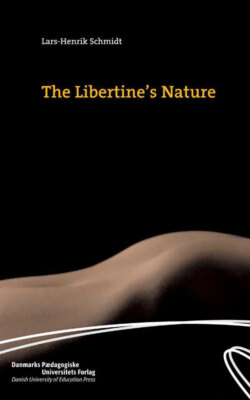Читать книгу The Libertine's Nature - Lars-Henrik Schmidt - Страница 13
На сайте Литреса книга снята с продажи.
Please, Please Me
ОглавлениеThe point should be (and may be expressed with a precise ambiguity) that one’s pleasure is the other’s pleasure: one takes pleasure in the other, and one takes pleasure in the other’s pleasure. With this a radical shift occurs, however, from the other to one-self (oneness), for the point of sensuality is that there can very well be coevalness in pleasure, which is something other than reciprocity and system, that is to say, commonness in craving: the unarticulated “disagreement,” or rather socius, unexperienced incompatibility. Thus it must be craving that creates the possibility for love, not the reverse. In other words, I wish to accomplish a revaluation.
Maybe this coevalness in pleasure, this complaisance, ought to be called sympathy in the same sense as compassion, but the situation today is that moral philosophy has monopolized the use of sympathy as a counterpart to antipathy and to egoism; it is hardly possible to extract a new meaning from this category: the concurrent feeling of sympathy is a form of reciprocity, but that is not the case with the being-in-tune of coevalness. One can empathize with the other, but one cannot feel the other’s feeling. Helvetius knew this, and Wittgenstein repeated it in his own fashion later. We are now left with another phenomenon: the possibility for resonance, which we will name common pleasure or simultaneous pleasure (with all the ‘simul’ associations); just like when an offer of meaning is repeated.
This is different from empathy since one also relates to the other’s relations, in that there is no common denominator, no joint object. Commonely one takes pleasure in loneliness and lonelily one takes pleasure in commoneness. Only he who is not alone can be lonely, so what counts here is being “one among people.” The loneliness of pleasure is not sad or lamentable but tragic, for it is in the midst of attempting to become one flesh that the radical difference makes itself felt. With those to whom one is attached one must refrain from becoming one flesh. One experiences here the situation of belonging to the difference from the other, and as a form of consumption pleasure is a confirmation of individuality in the middle of an attempt at transgressing individuality. The importance of the sense of imagination for pleasure is an indication of the condition of radically lonely commoneness, which is not to be mistaken.
The issue that is going to be of interest to us is, then, how one abstains from taking pleasure in the other and instead takes pleasure in the other’s pleasure, that is, instead of taking pleasure in the other. How does attachment imply abstention? This is what we are going to examine by seeing how a boundary is marked out with respect to taking pleasure in the other. And at this point two possible reasons can be given: either one is not capable of it, in which case abstention is a Nietzschean respect, or else one abstains from taking pleasure in the other with a view to one’s own pleasure. If the other is dead he cannot act as a substitute for one’s pleasure. This is among the theses that we are going to examine in what follows. There are ways in which one must abstain from taking pleasure in the other.
The fact is that inasmuch as the social must take place, one must abstain from the phenomenon we are going to analyze under the appellation “cannibalism.” A boundary is drawn with respect to how one can take pleasure in the other. Social anthropophagy is, as I am going to attempt to demonstrate, excluded, impossible in the social, for transgression is the same as terminating socius. It is therefore neither a command nor a prohibition but the offer of commonness that is crucial for the occurrence of the social.
It is this frontier outpost that we are now going to seek out in Sade’s libertine nature, in the actual will to excess.
